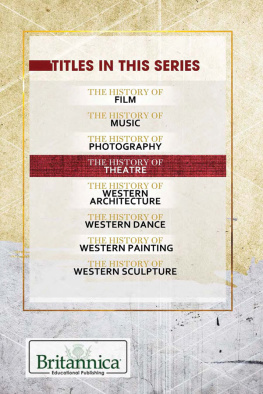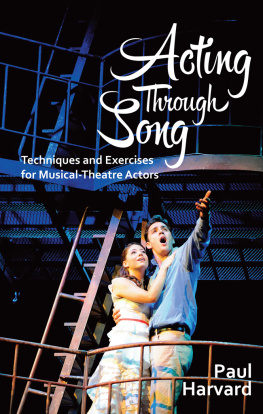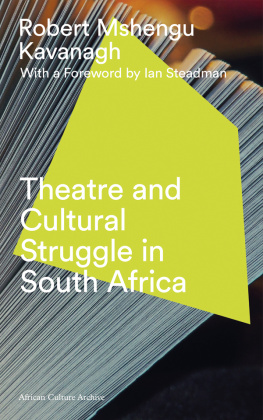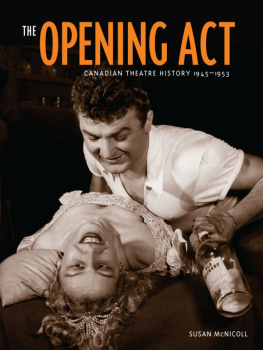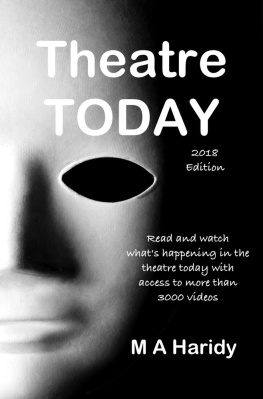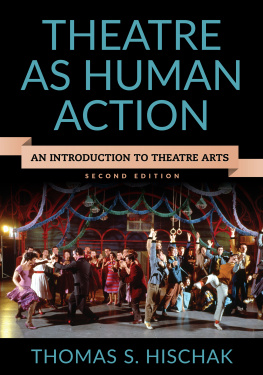ibidem Press, Stuttgart
This book is an expanded version of the arti cle Forum theatre for peace E xperiences in Uganda, Rwanda, DR Congo and South Sudan, published by The Civil Peace Service Ne t work (CPS) in Theatre for Peace CPS work in Cameroon, DR Congo, Nepal, Rwanda, S i erra Leone, South Sudan and Uganda, Bafoussam, Berlin 2014. The publication was su p ported by Brot fr die Welt Evangelischer Entwicklungsdienst (Bread for the World Church Development Service) and financed through the German Ministry for Economic Cooperation (BMZ).
Foreword
It has been nine years since the start of the book series Berlin Papers on the Theatre of the Oppressed with Anne Dirnstorfers publication on Forum Th e atre in Nepal, and it is with great pleasure that I introduce the first English-language volume, Claus Schrowanges Art and ConscientizationForum Theatre in Uganda, Rwanda, DR Congo, and South Sudan . Since the practice of Forum Theatre (and the scope of the series) is an international one, I hope this book can find readers around the world more easily than books in my n a tive German.
Claus Schrowange will take you on an interesting journey to Uganda and South Sudan, presenting the Forum Theatre style of Rafiki Theatre, and to Rwanda and the Democratic Republic of the Congo with Badilika Theatre. He describes his approach and methods, his experiences with the trauma-healing effect of theatre, and concludes with his views on the opportunities and limitations of Forum Theatre in peace work.
I would like to thank Claus for all the hard work of updating an essay he wrote for Christiane Ka y ser and turning it into a bookI know theatre makers are always busy, but he took the time, and now we can all gain insight into his e x periences and hopefully integrate some parts into our own work and projects.
The world in its current state can certainly use all of our efforts.
Berlin
August , 2015
Harald Hahn
www.harald-hahn.de
Acknowledgments
I wish to thank the actors of the participatory theatre troupes I have worked with in Uganda, South Sudan, Rwanda, and DR Congo. Without their readiness to explore the power of theatre for peace, this book wouldnt have been poss i ble.
I am grateful to Gabor Csetneki for teaching me his alternative approach to theatre.
Thank you Harald Hahn for introducing me to Forum Theatre and e n couraging me to write this book, and for your trust and believe, that it will add value to the world of theatre practitioners.
I want to thank Christiane Kayser for motivating me to finally start wri t ing about my experiences, and for publishing an article in her Building peace series.
I wish to thank all organizations that have supported my work in Africa, especially the United Evangelical Mission, Bread for the World, the German Association for Development Cooperation (AGEH), and the German Intern a tional Cooperation (GIZ).
A special thanks goes to Uli Thum, who invited me to South Sudan to share my experiences and to form a theatre troupe.
I am grateful to Rev. Joshua Lusenge Kasereka, coordinator of APRED-RGL, for giving me space and time to explore the use of participatory theatre in peace work in Rwanda and DR Congo.
Finally, I would like to express heartfelt gratitude to my wife Sophie and my sons Mano and Lou, for living with my passion for theatre. This book is dedicated to you.
August , 2015
Claus Schrowange
Introduction
In 2009 I attended the World Forum Theatre festival in Graz. Forum theatre troupes from Asia, Europe and South America were presenting their work. Workshops during the day, performances in the evening. Three performances touched me especially. Actors from the London-based group Cardboard Cit i zens created an emotional link with the audience by just being themselves. The actors were homeless people, playing their real life experiences on the streets of London. Through the authentic ity of their way of acting they b e came believable. The audience felt with them and for them. This immediately broke the barrier between spectators and actors.
The sec ond group which left a lasting impression was Jana Sanskriti from India. Their style of forum theatre includes dance, movemen t, images and a lot of symbols that leave a space for personal interpretation and imag i nation, and are both artistic and educational . Jana Sanskriti is working mainly on Gender - Based Violence in India.
Finally, there was TO-Tehran, a University- affiliated Iranian theatre group , using forum theatre against oppressive systems. With simple black T-shirts and with just a few symbolic items , they were acting injustice and ab use of power in a serious as well as an absurd manner, speaking out the truth while making the audience simultaneously laugh and reflect on the i s sues presented.
What was missing in Graz was a group from Africa. This fact and the vi s ually powerful impact of some performances motivated me to integ rate f o rum theatre in my practic e and explore its opportunities for peace work.
My theatre background is more or less an alternative one. I was trained by Gabo r Csetneki, a Hungarian theatre director , who has an actor- centered approach , where theatre becomes a discovery and expression of body, heart and soul, rather than the classical approach where actors repeat some se n tences others have written. I also had the chance to meet and be trained by Keith Johnstone, the inventor of improvisation theatre. Harald Hahn a Ge r man TO-practitioner introduced me to Augusto Boals methods.
I started in November 2009 to work for EAIGCM . In January 2010 I gathered 12 students and young graduates of Music, Dance & Drama from Makerere University , Kampala, all of them hungry to apply what they had studied. Rafiki Theatre was born. During the next four years we explored the possibilities of participatory theatre for the promotion of peace, human rights and sustainable development. We developed our own style an em o tional and provocative, authentic and believable way of acting; integrating music, dance, movements, images , and symbols.
Productions on various topics were designed, and then more than a hundred performances were given in Uganda, Kenya, Rwanda , and South S u dan. Seven forum theatre troupes in Uganda and o ne in South Sudan were trained by Rafiki . We developed plays with them and supervised their work. We participated in festivals and larger campaigns, did street theatre as well as indoor performances. Rafiki Theatre did forum theatre with illiterate pe o ple in the remotest places as well as with the intellectual city elite. The style we developed became known and experiences were shared at universitie s and during various workshops.
2013 I left Uganda for Rwanda, where I started as UEM , a regional peace initiative hosted by protestant churches from Rwanda, DR Congo and Burundi. APRED-RGL is building local capacities for peace and promoting reconciliation in the Africa n Great Lakes region, a r e gion that has been plagued by decades of instability and armed conflicts, lea v ing behind humanitarian crisis, poverty , and deep-rooted hatred against the perceived enemy.
In Augus t 2013 I found myself in Goma, DR Congo, in a not yet comple t e d, dusty small building of the CBCA , together with the youth group Jeunesse en Action . We did a forum theatre workshop while 7 grenades were explo d ing, one less than a kilometer awa y as the crow flies. The local people were blaming Rwandans for being behind the attack. The atmosphere was tense. Despite this we decided to continue, developed a short play and integrated the fears of our workshop participants into some of the scenes. Finally we performed to 200 people in a CBCA church. The play was about the hatred of the people o f Goma for the people of Rwanda . I saw that the Rafiki style could add value to the program of APRED-RGL.


